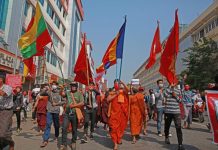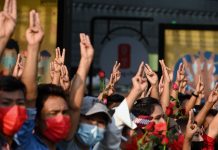
President Donald Trump signs Uighur human rights bill to punish Chinese officials responsible for repressing the Muslims in Xinjiang, China.
In a statement, the White House said the Uyghur Human Rights Policy Act calls for sanctions against those responsible for repressing Uighur Muslims's rights in the province.
Signed without any public event, the bill passed the US Congress nearly unanimously. The signing gives China a strong message on human rights.
The bill, which sanctions those responsible for the oppression of the Muslim minority in Xinjiang, was signed an hour after forthcoming book of former White House National Security Adviser John Bolton accuses the president that he told Chinese President Xi Jinping he agrees to having “concentration camps” for the detainment of Uyghurs in western China.
According to the United Nations estimates, over a million Muslims have been imprisoned in camps in Xinjiang.
A "signing statement" by Trump reveals that some of the bill's sanctions requirements may reduce his constitutional authority as president to practice diplomacy so he would consider them as advisory, not mandatory.
Another allegation in Bolton's book is that Trump expressed his approval of Chinese President Xi Jinping explanation of "why he was basically building concentration camps."
Bolton says that the US interpreter suggested that Trump is in favor of the camps. Bolton also writes that Matt Pottinger, a National Security Council official who is hawkish on China, told him that the president made the same statement during a 2017 trip to China.
US-China tension
The brewing tension between the US and China is rooted in many things and has branched out to several issues.
One of this is the US' decision to remove the special favors it has been giving Hong Kong after Beijing imposed a national security law on the special administrative region.
There are no definite details about the law yet. However, according to China, it will address secession, subversion of state power, terrorism activities and foreign interference. Beijing’s move bypasses Hong Kong’s legislature and may take a few months before it takes effect in the island.
Hong Kong leader Carrie Lam told the public that their rights and freedoms will still be intact. In a statement about China’s approval of the bill, she explained that the national security law “aims to prevent, curb and sanction an extremely small minority of criminals who threaten national security, safeguarding the prosperity and stability of Hong Kong and maintaining ‘One Country, Two Systems.’”
But not all leaders share the same perception.
The US will end its special treatment of Hong Kong, according to Trump.
“The United States wants an open and constructive relationship with China but achieving that requires us to vigorously defend our national interests,” he said at a White House briefing.
He also discussed actions over China’s handling of the coronavirus outbreak, state-led industrial espionage, and fraudulent activities by Chinese companies.
He emphasized the impact of the policy change on several US-Hong Kong agreements, from extradition to export controls, with few exceptions.
“China claims it is protecting national security, but the truth is that Hong Kong was secure and prosperous as a free society. Beijing’s decision extends the reach of China’s security apparatus into what was once a bastion of liberty,” said Trump.
The US plans to sanction mainland Chinese and Hong Kong officials who participated in “absolutely smothering” Hong Kong’s liberties.






